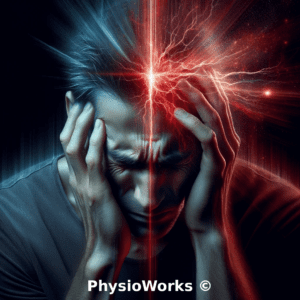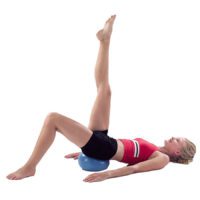Cluster Headaches
Article by John Miller

Cluster Headaches: Navigating Through the Pain
What are Cluster Headaches?
Cluster headaches stand out as one of the most severe primary headache disorders. Commonly beginning in the late twenties, they impact men more than women. The intense pain of these headaches is often overwhelming, with some sufferers contemplating extreme measures.
Recognising Symptoms
Key symptoms of cluster headaches include one-sided eye swelling, nasal congestion, facial sweating, and restlessness. These headaches have a distinct pattern, occurring daily for periods of 3 to 6 weeks, and each episode can last from 15 minutes to 3 hours.

Diagnosis: A Clinical Approach
Diagnosing cluster headaches involves recognising symptom patterns and treatment responses. Neurologists often lead this process, as no single test can confirm the diagnosis.
Imaging’s Role in Diagnosis
Contrary to popular belief, imaging tests like X-rays and MRIs don’t diagnose cluster headaches. However, they’re vital in ruling out other causes of persistent headaches.
The Complexity of Mixed Headache Types
Over 300 types of headaches exist, and it’s common for individuals to suffer from more than one type simultaneously. This complexity can challenge both diagnosis and treatment.
Exploring Various Causes
Both doctors and physiotherapists play a role in diagnosing the alternative source of headaches. Occasionally, headaches might signal a more serious condition.
The Importance of Professional Diagnosis
Utilising headache questionnaires helps in classifying and managing headaches. Sharing these findings with healthcare providers is crucial for developing a tailored treatment plan.
Physiotherapy Influence on Cluster Headaches
Physiotherapy offers several benefits in the management of cluster headaches, a condition known for its intense and debilitating pain. The approach of physiotherapy is multifaceted, focusing on alleviating pain, reducing frequency, and improving the overall quality of life for sufferers.
- Pain Management: Physiotherapists employ various techniques such as manual therapy, trigger point therapy, and soft tissue massage to help reduce the intensity of pain associated with cluster headaches. These methods can provide immediate relief from discomfort.
- Posture and Ergonomic Advice: Poor posture can exacerbate headache symptoms. Physiotherapists provide valuable advice on maintaining correct posture and ergonomic setups, especially for those who spend long hours at a desk or computer. This can help in reducing the triggers of cluster headaches.
- Stress Reduction Techniques: Stress is a known trigger for many headache types, including cluster headaches. Physiotherapy includes relaxation techniques and stress management strategies that can help in reducing the frequency and severity of headaches.
- Exercise Therapy: Tailored exercise programs, including neck and shoulder exercises, can help in strengthening the muscles and improving flexibility. This can reduce the tension and stiffness that often contribute to headaches.
- Education and Self-Management Strategies: Physiotherapists educate patients about their condition and provide strategies for managing symptoms at home. This includes teaching self-massage techniques, relaxation exercises, and the use of heat or cold therapy.
Incorporating physiotherapy into the treatment plan for cluster headaches can lead to significant improvements in pain management and overall wellbeing. It’s always recommended to consult a physiotherapist for a personalized treatment plan.
Conclusion
Cluster headaches bring intense pain and require a methodical approach for diagnosis and management. Understanding their nature and seeking expert care is essential.
What to Do?
If you’re experiencing symptoms of cluster headaches, seeking the advice of a physiotherapist can be a crucial step. They can guide you in managing pain and recommend effective treatment strategies.
Related Articles
- Headache Causes: A broader overview of various headache types, including cluster headaches, and their potential causes. It’s helpful for understanding the range of headaches and their specific characteristics.
- Headache, Neck & Jaw: This article explores the connection between headaches and issues related to the neck and jaw. It’s useful for understanding how these areas can contribute to headache pain.
- Headaches Or Migraine: Offers insights into differentiating between general headaches and migraines, including cluster headaches. This can be helpful in identifying the type of headache you might be experiencing.
- Severe Headache Symptoms: Urgent Red Flags & Care: An important article that helps identify severe headache symptoms that require immediate medical attention. It discusses red flags in headache symptoms that shouldn’t be ignored.
- Tension-Type Headaches: This article describes tension-type headaches as marked by a band-like pain around the head, often linked with stress, poor posture, and muscular tension. It emphasises the role of physiotherapy in managing these headaches, offering techniques like stress-reduction, ergonomic advice, and exercises to improve posture and muscle function.
- Cervicogenic Headaches: The article on cervicogenic headaches, also known as neck-related headaches, discusses their typical symptoms like steady, non-throbbing pain at the base of the skull, around one eye, or over the top of the head. It highlights the importance of a thorough neck examination by a skilled headache physiotherapist and the effectiveness of physiotherapy techniques in treating these headaches.
- TMJ Headaches: In the article on TMJ or jaw-related headaches, it is explained how these headaches are localised around the jaw and ear, affecting one side. They are often accompanied by jaw movement issues, chewing difficulties, or sensations of clicking, locking, and catching in the jaw. The article suggests that TMJ physiotherapists and dentists are good practitioners to start with for assessing and treating TMJ headaches.















































